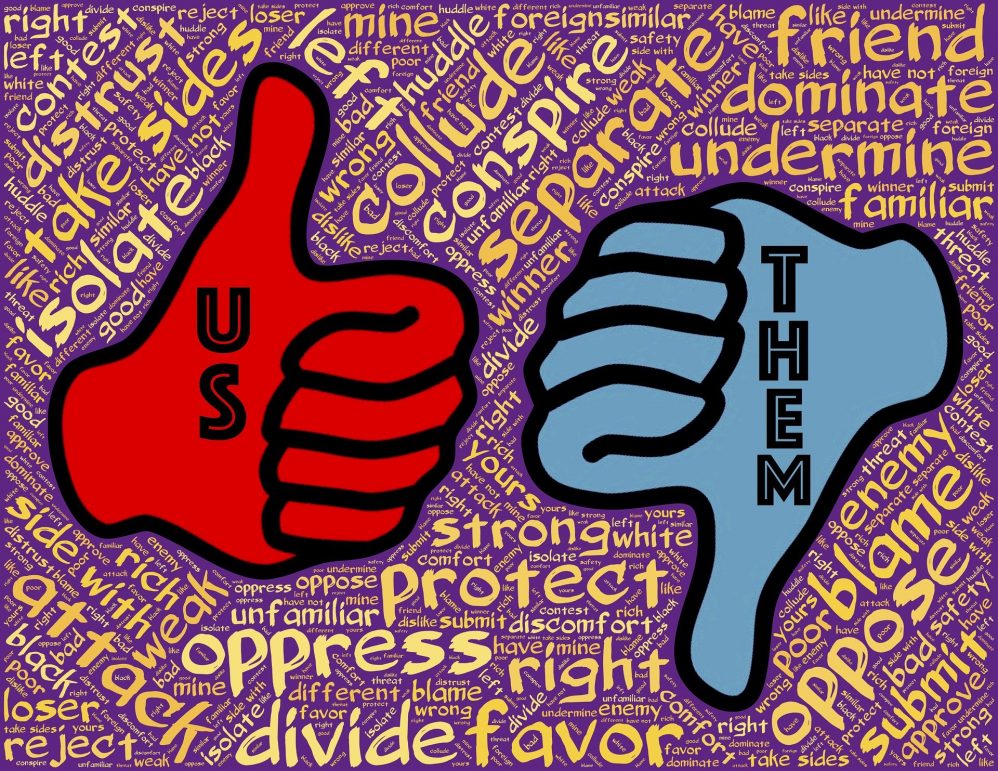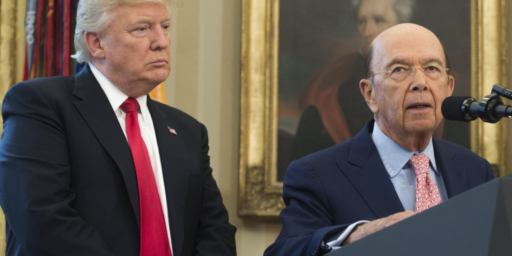The Radicalization of Ross Douthat
An interesting podcast conversation.

Yesterday’s edition of the Ezra Klein Show, “Ross Douthat Has Been ‘Radicalized a Little Bit, Too,’” is well worth a listen (or you can simply read the transcript). It’s the type of conversation that has become all too rare in American politics. Two people who disagree vehemently on many issues but like and respect one another enough to acknowledge when the other makes a good point, thus advancing the debate.
The main conversation revolves around this:
So if you’ve been listening to the show, you know I’m a little worried about the Republican Party’s turn against democracy. But look, maybe I’m being alarmist. There’s a case for that. If you dig into the research, whatever you think of voter ID laws morally, they don’t seem to have a huge effect on outcomes.
These various laws Republicans are passing to politicize the election administration, they don’t really need new laws to do that. They have all kinds of powers that could be used or misused now. So maybe it’s all just for show. Donald Trump, he’s a waning force. The guy doesn’t even have a Twitter account anymore. And so maybe the unique dangers he posed have passed.
This isn’t my take exactly, but it’s close to my colleague Ross Douthat’s take. He’s had a series of columns arguing that people need to chill a little bit on the alarmism around elections and democracy. And I’ve known Ross a long time. We were bloggers way back when. And I respect him tremendously. So I wanted to have him on the show to hash it out. Am I being alarmist, or is he being too chill?
I started and remain a bit closer to Klein’s position on this than Douthat’s. But the latter makes several good points. But the most interesting thing about the debate is how readily they concede the validity of the other’s concerns.
Douthat:
I want to start by saying that I, too, am alarmed by the prospect of having Donald Trump as the Republican nominee in 2024, which seems to me quite likely and deeply undesirable. And I think that I can see scenarios not completely different from the scenarios feared by liberals, where that, in a worst case scenario, leads to some kind of crisis in the House of Representatives and the Senate wrangling over electoral votes, right?
I’m not here to offer you a case for total blithe relaxation, Trump is in the rearview mirror, everything’s normal again. I don’t believe that. But I don’t think hardly any of the bills that have been passed or seriously considered in statehouses by Republican majorities are all that relevant to what would actually be the potential crisis or potential challenge in 2024.
Klein:
[I]f you look at a number of the Republican laws that have been up for debate in the states, in many cases, they’re basically taking things like early balloting back to pre-pandemic rules, or they’re finding sort of a place in between the pre-pandemic and the pandemic rules. And you can argue about whether maybe the pandemic rules were the optimal rules, but if your worry is that the rules create a situation where an extra thousand votes swings here and there, that’s been true of every shift in election rules that you’ve had for many years.
And it’s not clear to me that saying, all right, we’re going to strike a balance between our emergency provisions for early voting and our pre-emergency provisions for early voting is sort of a particularly gross injustice or unreasonable. All early voting date numbers are arbitrary. And I mean, I think even the most aggressive pro early voting people don’t think you should have early voting starting the moment the prior election ends, right?
The rest of that particular debate is interesting but perhaps the most interesting exchange is this one:
ROSS DOUTHAT: Because the Democratic Party actually controls the government of the United States at the moment, right? It controls the presidency, it controls the House, and it controls the Senate. Now you can say that in a perfectly just world, it would have 10 more seats in the House and an extra senator or two. And Joe Biden wouldn’t have had to sweat Pennsylvania, right? That’s fine.
But in fact, the Democratic Party controls all of government. And the real pattern of the last 14 to 16 years in electoral outcomes is not this sort of countermajoritarian consolidation by the Republicans. It’s constant swings. The House of Representatives, the most representative body you could say, swung in 2010 and again in 2018. The Senate has swung repeatedly. The presidency has swung repeatedly.
So the reason that the Democrats have not been able to sort of consolidate their, let’s say, 51 to 48.5 majority into something that can win more consistently is, in part, that they haven’t been able to win the landslides that used to be the way that America was governed.
And this is one of my hobby horses, but I’ll just ride it for a second, right? The American system, as it evolved basically across the 20th century, was set up — not that anyone per se designed it this way — but it was very responsive to presidents and political parties, maybe especially presidents, winning 55 percent, 54 percent victories, which then set you up to sort of govern at a 55- or 60-vote or more majorities for your agenda.
And part of what’s happened over the last 20 years is that no one is able to win those kind of majorities. And so you have repeatedly — President Obama came closest in 2008 and, in fact, did get the most done in certain ways, as a result. But you consistently have presidents winning narrow majorities, as Bush did in 2004, say, or Biden did in certain ways this time, and trying to govern like FDR and LBJ and Reagan. And that just doesn’t work.
And that may be a case for some of the constitutional reforms the Democrats want to see. But I think having that history in mind, there’s never been a moment in American history where parties have consistently won 50.5 percent of the national popular vote and then just sort of governed the way some liberals want to govern at the moment. It’s just not part of 20th century American politics, certainly.
EZRA KLEIN: And even more — I mean, I’ll just back this up a little bit more, which is to say that it has never been this competitive. There’s a great book by Frances Lee, the political scientist, called “Insecure Majorities.” And she makes a real argument that a lot of the polarization, a lot of the super intense campaign strategies, and a lot of the inability to cooperate in Congress comes from the fact that we do not have a consistently dominant party, which has been the norm through most stages of American politics.
When you have a dominant party, the minority party has an incentive to learn how to work with them. But when don’t, when everybody is always on the knife’s edge of taking back the House, taking back the Senate, taking back the presidency, then it’s much more all out legislative war because you’re trying to make them fail because then you’re going to get into power next time. I talk a lot about this in my book, “Why We’re Polarized.” [emphases mine-jj]
This bit from Douthat, though, confused me a bit. It comes after a discussion of J.D. Vance’s seeming shift from a reasonable conservative into a Trumper (and gives the episode its title):
ROSS DOUTHAT: Well, the Democratic Party moved substantially to the left. A lot of crazy things happened. Again, we had massive street protests of pandemic turmoil and all kinds of institutions. A lot of stuff went on in the last four or five years. The Kavanaugh hearing was an inflection point for some conservatives. And there’s been a general and I think sincere radicalization of a lot of people who fall or fell into an Ezra Klein’s thoughtful conservatives camp in 2015. And obviously, this hasn’t happened to me because my livelihood depends on being a thoughtful conservative who writes for a liberal readership. And so because of that, I’m sort of constrained and talked to my conservative friends —
EZRA KLEIN: Do you think it would have otherwise?
ROSS DOUTHAT: Well, I mean, I think maybe I’ve been radicalized a little bit, too, but I’m not going to tell you all of my most radical thoughts. Some of it is a little more mysterious to me, right? I looked at the Kavanaugh hearings and saw it as the case where I felt like I could see where both sides were coming from. And the fact that he ended up actually being put on the court, that was not a radicalization moment for me.
I think some of the shifts in sort of internal left wing discourse and politics over the last year or two, maybe some events cost people their jobs in certain liberal institutions … I won’t go into any great detail here, but some of that has had some kind of inevitable effect on me, yeah, absolutely. I guess I’m just saying when there is both a performative element to Republican Trump imitations and also a sincere shift in how some conservatives think about the left and what it wants for America, both of those things are in play in general.
So, I agree that the Democratic Party has moved substantially to the left over the last five years or so. Joe Biden, who was much more moderate than Barack Obama in 2008, is now governing much more progressively than the man he served. Indeed, I’ve argued that Biden did something unprecedented this cycle: running as a relative moderate in the Democratic primary to defeat the likes of Bernie Sanders and Elizabeth Warren and then tacking left, taking pages from their policy playbooks, afterward.
But the Kavanagh hearings strike me as an odd thing to get “radicalized” over. He was confirmed to the Supreme Court despite credible accusations of sexual assault and an absolute meltdown in his appearance before the Senate.
Now, I presume the “maybe some events cost people their jobs in certain liberal institutions” bit is a reference to the so-called Cancel Culture and the atmosphere at the New York Times (which employs both Klein and Douthat) that led to the firing of editorial page editor James Bennet and health reporter Don McNeil and the resignation of Bari Weiss. It’s not clear, though, if Douthat has actually been “radicalized” or feels more constrained to tow a party line.
I would say that it helps explain why I find Douthat better on podcasts (he used to co-host “The Argument” until the baton was passed to Jane Coasten; I have no idea what drove that) than in columns but I’ve found his columns odd for a long time.
There’s quite a bit more to the conversation, including a bit that I’ll spin off into a separate post, but it’s worth a read/listen.





This is Douthat’s standard schtick for a non-right audience — agree that there is a perception of a problem, but it’s really not as bad as liberals are making it out to be. Explain that whatever is happening on the right is really just a reaction to something that’s happening on the left, and so it’s actually nothing to worry about. And then mention that the world hasn’t come to an end yet, so everyone should just stop paying attention to the ways the Republican party is trying to undo democracy so we can all get along.
He’s very good at pretending not to be radical. Except when he starts talking about sex, which is where his truly bizarre side comes out.
I can see why the Times hired him — he does a very good job of hiding right-wing radicalism under a soothing tone.
On the other hand, I find Jane Coasten to be one of the single dullest people on the planet and do not understand why they gave her The Argument, which was fairly entertaining under Douthat and Michelle Goldberg. If I were a cynic I might think it’s because she’s a gay, Black libertarian, so she ticks off a lot of boxes…
No. No, they do not. At least not if the word “control” has any meaning.
The only way to “control” the Senate under current rules is to have 60 seats.
I understand that they have a bare majority and could if they had the will, assert full control (and so some of the blame for lack of control belongs to the Dems themselves). But I bristle when people say that the Dems “control” the government, as it is not true operationally. The Dems are not in a position to actually govern, which is what the word “control” implies.
Moreover, the seats that the Reps have in the Senate substantially inflate their influence–also undercutting “control” of the chamber.
Likewise, we cannot forget that the majority on SCOTUS is the result of presidents being elected without majority support being confirmed by Senate’s representing a significant minority of the population.
@wr:
This is where Douhat (and his ilk) always botch their debate points. The core premise – that the Democrats drove the Republicans to be radical – is never very well explained or supported by clear evidence. The Kavanaugh hearings (where a belligerent judicial nominee likely perjured himself before Congress and was nevertheless placed on the Supreme Court) is the epitome of leftist provocation? Seriously? Please walk me through how A leads to B there!
On the other hand, that the “Democratic Party has moved substantially to the left over the last five years or so…” has a much clearly cause and effect when you consider who came down an escalator about 5 years ago and how the GOP has responded since his arrival. As I’ve said before, if the car is about to go off the cliff to the right and one wrests the wheel hard to the left to avoid the plummet, that’s course correction. It isn’t radicalism.
@wr:
I don’t think that’s what he’s doing here, really. He was pretty rabidly anti-Trump. He’s just pointing to the limits of what’s actually been done and noting that the guard rails held pretty well. But I do think he vastly underplays the degree to which the GOP leadership rallied to Trump and refused to count legitimate Electoral votes.
@Steven L. Taylor:
Yes, I noted that mentally when listening to the conversation during yesterday’s commute but neglected to mention it here.
I read statements like that one and my jaw just drops. It’s almost as though we don’t even know where left IS anymore.
If you tried to come up with a reasonable normative standard of what qualifies as right or left across, say, all OECD nations, it would be hard to conclude that the Democrats are not a center RIGHT party.
I had to turn off The Daily this morning because the interviewee said Right? several times per sentence. Yeah, it sounds petty, right?, but to ears that used to right? Do radio, right? It was annoying, right?
Every time I hear anyone say the Dems have become leftier I say prove it. Specifically what issues. The way I see the polls is that the main Dem position has stayed about the same on ALL issues the last twenty years. Two things have happened, one, on some issues the country as a whole has moved to the left (pot, gay marriage); two, the press, with an assist from Fox, voluminizes the more marginal positions and mischaracterizes other positions for obvious reasons (defund the police) which in turn creates this perception of the Dem shift which is simply inaccurate.
I agree with Stormy Dragon that the American Democratic Party is pretty center right by any international norm. I am frequently reminded how fundamentally conservative the US is. It is often inches away from a theocracy.
@James Joyner: “He was pretty rabidly anti-Trump. ”
Yup, that’s part of the game. Rabidly anti-Trump — but all the stuff Trump did? Not really a problem, libs are making too much of it because they hate him. Kids is cages, that’s overstating it, and Obama had the same issues. All that stuff about Russia and corruption — well, we can see why libs want to make a big deal of it because they’re right to hate him, but obviously there’s not actually anything going on, so we should all just tone it down. And look, now the libs are getting mad about the supreme court, but you know, McConnel stole a seat, then libs were mean to Kavanaugh, so it’s all good, and there’s no way someone like Amy Coney Bryant will really vote to overturn Roe v Wade because everyone loves stare decisis, so let’s talk about Trump’s hair some more.
He’s the nice guy in the concentration camp whispering “no, it’s really going to be all right if you just keep following orders. I mean, why would anyone want to hurt you?”
@Scott F.:
That’s because most people are aware “it’s your fault you make me hit you” isn’t a notion that can be supported by evidence or logic. It’s abuser “logic” – the kind a bully tells you and you’re just supposed to take their word for it. It’s a emotional argument, meant to strike deep in your psyche and make you feel bad.
Please explain, as a matter of policies that have actually passed, how this is a true statement. Because it’s fundamentally untrue.
@Steven L. Taylor:
Which is a rule the Democrats have, right now, the control and power to change.
So the fact that there are internal divisions within the Democratic party and among Senate Democrats regarding Senate rules doesn’t change the fact that the party is in control of the Senate (and House and Presidency).
For conservatives Kavanaugh remains a major tragedy. They barely remember Merrick Garland. So they were a little mean to Kavanaugh and he made it to the Supreme Court. Garland never even got a vote. Given a choice I am sure that Democrats, and Garland, would have been glad to reverse that with Garland ending up on the court and Kavanaugh left off.
Steve
I find this much like the average Douthat column, I’d probably disagree with him if it were clear what he’s saying. He’s maybe a bit radicalized in some vague way because he can see bothsides in Kavanaugh? He’s worried about Rs rat fracking an election but not very worried? And we’ve entered an odd period without clear dominance by one party but he doesn’t have any particular point about this? And vaguely some people have lost jobs in institutions, which could mean lefties who’ve lost jobs, the more common occurrence? Standard issue Douthat, not much sound, no fury, and signifying not much. Klein, though, did a nice job of supporting his coworker. I hope his editors and publisher are appreciative.
I will add, echoing someone or other, that extremism in defense of democracy is no vice and moderation in defense of moderation for its own sake is no virtue.
@Andy:
The default rule is what it is and regardless of what the theoretical changes might could be, it does not change the fact that at the moment the Democrats do not have full control of the Senate.
That that could be changed is true. But it doesn’t change what current reality is
Its difficult for me to tolerate any discussion of the Republican Party that doesn’t address first and foremost its turn against democracy, and instead discusses it like it was a normal political party within a functioning liberal democracy.
It isn’t just that the terrifying prospect of becoming an authoritarian regime is so gripping; Its that it isn’t possible to talk about authoritarian parties in conventional political terms.
The goal of conventional political parties is to win by delivering tangible benefits to as large a group as possible, earning their support. This is the virtuous cycle of democracy we all learn in grade school.
In this world, it matters a lot if the power stays on and the trash gets picked up.
The goal of authoritarians is to grab power by any means necessary. Most often this is accomplished by picking some outgroup to demonize so as to rally the ingroup.
In this world, it really doesn’t matter much if the power stays on and the trash piles up; After all there is always the outgroup to blame and the privations just make the faithful ingroup all the more dedicated.
We see this in action right now with Republicans who simultaneously dismiss the 1/6 attack and blame Pelosi for it; Dairy farmers who go bankrupt due to Trumps tariffs, and blame it on the immigrants; Rust Belt workers and coal miners who sink into poverty but blame it on environmentalists or gay sex or socialism or whatever they need to blame.
Any discussion about republicans that doesn’t grasp this is an exercise in futility.
@Steven L. Taylor:
This is a bizarre argument. Democrats do control the Senate – the issue is that Democrats don’t agree about changing Senate rules. The only thing stopping them is politics, not a lack of control or ability to do so. The fact that Democrats cannot agree about what to do about Senate rules like the filibuster does not mean that Democrats don’t control the chamber. It means that Democrats disagree about what to do.
Does your theory that Democrats don’t control the chamber because of the filibuster just apply to the filibuster rule, or does it also apply to all the other rules that can be tactically used by the minority? Because the Democrats have the power to change those rules too – right now.
@Andy: So, I know that you’re perfectly aware that there are only 48 actual Democrats in the Senate. But your argument depends on ignoring the party labels of the two Independents, because that’s the only way you can justify claiming that the Dems have control.
The actual tally, as you know, is 50-48-2. If you’re granting control based on the seats held by the party, then the Republicans have control. If you’re granting control based on the likelihood of a particular vote passing, then you have to factor in the filibuster. If you’re granting control based on “has the votes to kill the filibuster”, then it’s 51-50 against removing it according to a very optimistic reading of WaPo as of a month ago (i.e., everyone in the “Open” column backs a vote on the floor). In none of these scenarios do the Ds get to do anything useful.
The Democrats do not control the Senate except in specific fantasies crafted for the purpose of attacking Democrats.
@Andy: @Steven L. Taylor:
Maybe it’s just the [bolded] phrasing, but this strikes me as a more bizarre argument than Steven’s. The discussion is about a political party, composed of politicians, in a political body tasked with enacting…policy. (Virtually everything a legislature does is political.)
I can’t speak for Steven, but my read on his point is predicated on one particular word: default.
Defaults are powerful, particularly surrounding rules, especially in the high-stakes domain of governance.
All,
Steven’s definition of Senate “control” is completely novel and not one that has been used in my entire lifetime. He’s free to make up whatever definition he wants, but the longstanding common usage of the term applies to the majority party that controls the leadership, legislative calendar, and agenda, committee chairs, etc., and is not contingent on the Senate filibuster rule and never has been.
And we really ought to go back and see how people here characterized the 114th-116th Congresses when the GoP had control of the Senate but did not command 60 votes. Perhaps my memory is being uncharitable, but I certainly don’t recall anyone here boldly claiming that Republicans didn’t “control” the Senate despite lacking 60 votes.